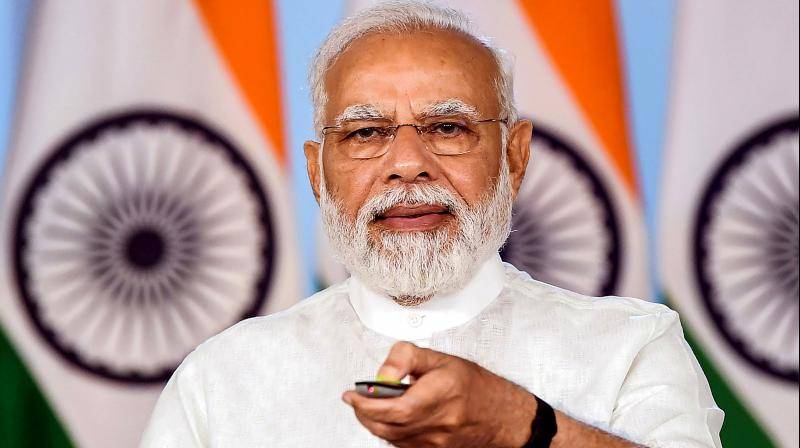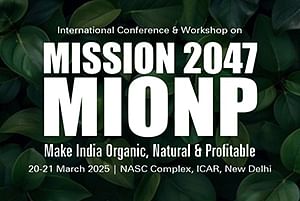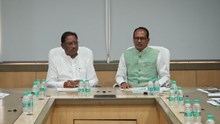
Yesterday, Prime Minister Narendra Modi participated in the Grand Finale of 'Ujjwal Bharat Ujjwal Bhavishya - Power @2047' via video conferencing. During the show, he introduced the Revamped Distribution Sector Scheme. He also dedicated and laid the groundwork for NTPC's various green energy projects. He introduced the National Solar Rooftop Portal.
In his address to the gathering, Prime Minister Narendra Modi stated that the energy and power sectors will play a significant role in accelerating India's progress over the next 25 years. The strength of the energy sector is also important for the ease of doing business and the ease of living.
He stated that the projects announced today are important steps toward green energy and energy security for the country. According to him, these projects will strengthen India's renewable energy goals, commitment, and aspirations for green mobility. The Prime Minister announced today that work on two large green hydrogen projects in Ladakh and Gujarat will begin. The Ladakh plant will produce green hydrogen for the country's vehicles. This will be the country's first project to enable the commercial use of green hydrogen-based transportation. Ladakh will be the first place in the country to see the use of fuel cell electric vehicles very soon. He believes that this will contribute to Ladakh becoming a carbon-neutral region.
The Prime Minister also stated that, after blending ethanol into gasoline and aviation fuel, the country is now experimenting with blending green hydrogen into piped natural gas pipelines. This will reduce reliance on natural gas imports.
Remembering the poor state of the power scenario prior to 2014, the Prime Minister recalled that the government took the initiative to transform every aspect of the country's power sector eight years ago. To improve the power system, four different directions were collaborated on: generation, transmission, distribution, and connection.
The Prime Minister stated that the country has added approximately 1,70,000 MW of electricity generation capacity in the last eight years. One Nation, One Power Grid has become the country's strength today.
To connect the entire country, approximately 1,70,000 circuit kilometres of transmission lines have been laid. Furthermore, by providing 3 crore connections through the Saubhagya Scheme, we are getting close to our saturation goal, he added.
"We had resolved to create 175 GW of renewable energy capacity by the completion of 75 years of independence," said the Prime Minister. We are getting close to achieving this goal. So far, approximately 170 GW of non-fossil capacity has been installed. He went on to say that India is now among the top 4-5 countries in the world in terms of installed solar capacity. Today, India is home to many of the world's largest solar power plants.
These plants, built in Telangana and Kerala, are the country's first and second largest floating solar plants. According to the Prime Minister, solar panels are being encouraged in homes. The Prime Minister stated that, in addition to increasing electricity production, the government is focusing on energy conservation. "Saved electricity means a brighter future." The PM Kusum Yojana is an excellent example of this. "We're giving farmers solar pumps and assisting them in installing solar panels on the side of their fields," he explained.
According to the Prime Minister, the UJALA scheme has also played a significant role in lowering the country's electricity consumption and bills. Every year, 50 thousand crore rupees are saved from poor and middle-class households' electricity bills.
According to the Prime Minister, losses in our distribution sector are in the double digits. In contrast, it is in the single digits in the world's developed countries. This means that there is a lot of electricity waste, and we must generate more electricity than is required to meet the demand for electricity. Many states, he claims, are underinvesting in reducing distribution and transmission losses.
The Prime Minister stated that people will be surprised to learn that various states owe more than Rs 1 lakh crore. This money must be given to power generation companies. Many government departments and local bodies owe power distribution companies more than 60 thousand crore rupees. He stated that these companies are unable to receive even the money that has been committed for electricity subsidy in various states on time and in full. This arrear is also in excess of Rs 75,000 crore. Those in charge of activities ranging from electricity generation to door-to-door delivery are trapped with approximately two and a half lakh crore rupees.
The Prime Minister asked the states with outstanding debts to pay them as soon as possible. Also, consider the reasons why, even when citizens pay their electricity bills on time, some states continue to have arrears. He stated that this is not a matter of 'Rajniti' (politics), but rather of 'Rashtra Niti' and nation-building.

















